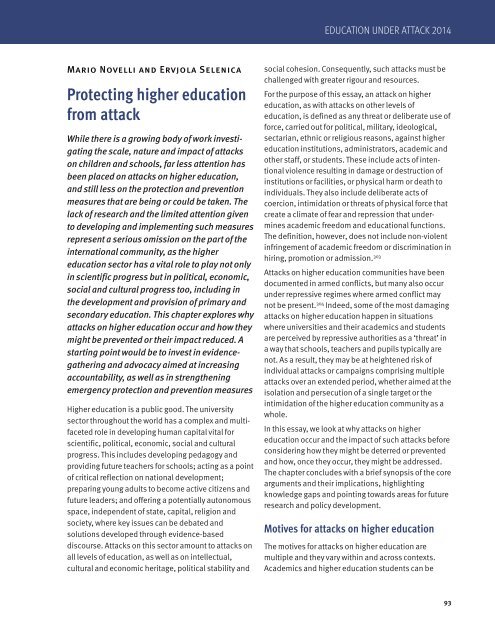eua_2014_full.pdf?utm_content=buffer4a392&utm_medium=social&utm_source=twitter
eua_2014_full.pdf?utm_content=buffer4a392&utm_medium=social&utm_source=twitter
eua_2014_full.pdf?utm_content=buffer4a392&utm_medium=social&utm_source=twitter
- No tags were found...
You also want an ePaper? Increase the reach of your titles
YUMPU automatically turns print PDFs into web optimized ePapers that Google loves.
EDUCATION UNDER ATTACK <strong>2014</strong>Mario Novelli and Ervjola SelenicaProtecting higher educationfrom attackWhile there is a growing body of work investigatingthe scale, nature and impact of attackson children and schools, far less attention hasbeen placed on attacks on higher education,and still less on the protection and preventionmeasures that are being or could be taken. Thelack of research and the limited attention givento developing and implementing such measuresrepresent a serious omission on the part of theinternational community, as the highereducation sector has a vital role to play not onlyin scientific progress but in political, economic,social and cultural progress too, including inthe development and provision of primary andsecondary education. This chapter explores whyattacks on higher education occur and how theymight be prevented or their impact reduced. Astarting point would be to invest in evidencegatheringand advocacy aimed at increasingaccountability, as well as in strengtheningemergency protection and prevention measuresHigher education is a public good. The universitysector throughout the world has a complex and multifacetedrole in developing human capital vital forscientific, political, economic, social and culturalprogress. This includes developing pedagogy andproviding future teachers for schools; acting as a pointof critical reflection on national development;preparing young adults to become active citizens andfuture leaders; and offering a potentially autonomousspace, independent of state, capital, religion andsociety, where key issues can be debated andsolutions developed through evidence-baseddiscourse. Attacks on this sector amount to attacks onall levels of education, as well as on intellectual,cultural and economic heritage, political stability andsocial cohesion. Consequently, such attacks must bechallenged with greater rigour and resources.For the purpose of this essay, an attack on highereducation, as with attacks on other levels ofeducation, is defined as any threat or deliberate use offorce, carried out for political, military, ideological,sectarian, ethnic or religious reasons, against highereducation institutions, administrators, academic andother staff, or students. These include acts of intentionalviolence resulting in damage or destruction ofinstitutions or facilities, or physical harm or death toindividuals. They also include deliberate acts ofcoercion, intimidation or threats of physical force thatcreate a climate of fear and repression that underminesacademic freedom and educational functions.The definition, however, does not include non-violentinfringement of academic freedom or discrimination inhiring, promotion or admission. 303Attacks on higher education communities have beendocumented in armed conflicts, but many also occurunder repressive regimes where armed conflict maynot be present. 304 Indeed, some of the most damagingattacks on higher education happen in situationswhere universities and their academics and studentsare perceived by repressive authorities as a ‘threat’ ina way that schools, teachers and pupils typically arenot. As a result, they may be at heightened risk ofindividual attacks or campaigns comprising multipleattacks over an extended period, whether aimed at theisolation and persecution of a single target or theintimidation of the higher education community as awhole.In this essay, we look at why attacks on highereducation occur and the impact of such attacks beforeconsidering how they might be deterred or preventedand how, once they occur, they might be addressed.The chapter concludes with a brief synopsis of the corearguments and their implications, highlightingknowledge gaps and pointing towards areas for futureresearch and policy development.Motives for attacks on higher educationThe motives for attacks on higher education aremultiple and they vary within and across contexts.Academics and higher education students can be93


